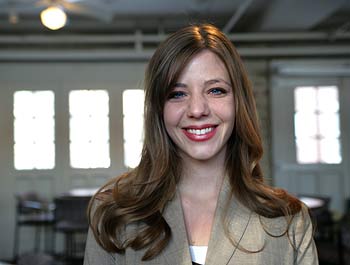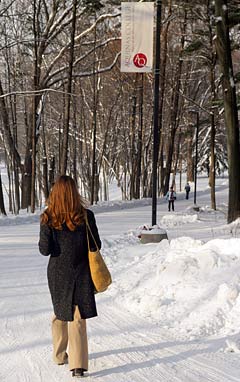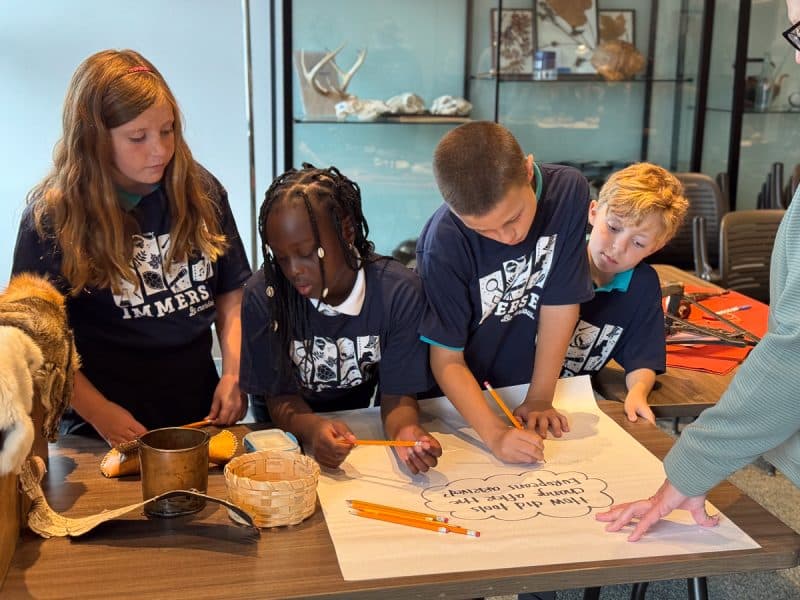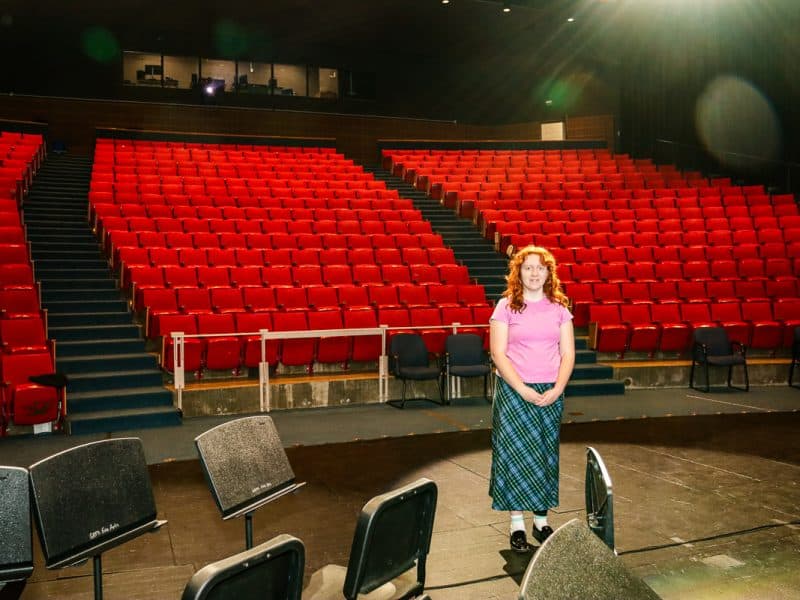Home Girl
Jessica Onan, one of the energetic young leaders of the city’s sustainability movement, grew up in Burton Heights, graduated from City High and Aquinas, and today lives in Midtown because, she says, GR is in her heart. She sat down to field a few questions from Rapid Growth.
Grand Rapids native Jessica Onan leads Aquinas Colleges’ effort to advance sustainable thinking on campus and throughout the city. The optimistic change agent talks about why she stayed in GR, the importance of mass transit, and cleaning products that save both money and lives.
You grew up in Burton Heights and graduated from City High, one of Grand Rapids’ more advanced secondary schools. You probably had a wide range of college choices around the country. Why did you choose to stay in your home town and attend Aquinas?
This was the only place I applied. So it’s a really good thing I got in. My heart and family are here in Grand Rapids. I have no desire to leave.
You were one of the first to graduate from Aquinas’ first-of-its-kind sustainable business program. Are jobs available for young professionals with that kind of training?
 It’s not like getting your standard accounting degree and applying to a hundred different firms. The sustainability field is still fairly new. Young professionals really have to prove themselves. What we’re seeing is new grads going into more traditional management roles, showing what they can do with, say, the corporate recycling responsibilities, and ultimately motivating their companies to create a position like a ‘sustainable business officer.’ That’s what so unique about the program, you learn to speak both the environmental and the business language. So you are prepared to communicate the ideas of sustainability more effectively to CFO’s and CEO’s. Locally, Spectrum hired one grad and Metro Health has three from the program.
It’s not like getting your standard accounting degree and applying to a hundred different firms. The sustainability field is still fairly new. Young professionals really have to prove themselves. What we’re seeing is new grads going into more traditional management roles, showing what they can do with, say, the corporate recycling responsibilities, and ultimately motivating their companies to create a position like a ‘sustainable business officer.’ That’s what so unique about the program, you learn to speak both the environmental and the business language. So you are prepared to communicate the ideas of sustainability more effectively to CFO’s and CEO’s. Locally, Spectrum hired one grad and Metro Health has three from the program.
You didn’t have to look too far to find a job. Your official title is program director for the Center of Sustainability at Aquinas College. What do you do?
My job is to include as many people as we can in this sustainability movement. So we’re working to embed the principles of sustainable business formally into the college curriculum and everyday operations. We also provide presentations, conferences, and events like the Community Recycling Day to educate people about the importance of their daily choices in the sustainability movement.
What’s one thing average people can do to promote the movement?
Get out of the car and walk or ride the bus.
How sustainable is the Aquinas campus?
We’re doing an inventory right now. Environmentally, we want to better understand our energy use, water demands, and other ecological indicators. Socially, we’re taking a look at how the college treats its employees and issues like pay equity. We also want to assess our financial performance, and whether the college is making forward-looking investments. The goal is to produce a snapshot of what’s happening on campus now so we can identify what we’re doing well and what we can improve on. It will also help us measure the success of future programming. Overall, we have made some real progress toward sustainability. But we certainly have plenty of work to do.
Can you cite a successful example where the college changed business as usual to embrace sustainable thinking?
We’re instituting a green cleaning product line on campus. The move is generating annual savings for our maintenance department. Unit for unit the products are cheaper. Yet they don’t have all these crazy instructions like ‘don’t inhale,’ ‘wear gloves,’ or ‘don’t swallow.’ So we’re not only using products that are cheaper, they also won’t kill people when you clean or cause serious harm to the environment.
How did you develop a passion for the environment?
 I went to John Ball Zoo School in the 6th grade. That really opened my eyes to a different understanding of the world around us. Going to school in the inner city, it seemed you were never outside except during recess. At Zoo School we were regularly outside with quiet time where you had to sit in the woods, write in journals, and be introspective. That’s where my connection to the natural world began.
I went to John Ball Zoo School in the 6th grade. That really opened my eyes to a different understanding of the world around us. Going to school in the inner city, it seemed you were never outside except during recess. At Zoo School we were regularly outside with quiet time where you had to sit in the woods, write in journals, and be introspective. That’s where my connection to the natural world began.
What compels a 25-year-old like you to stay in Grand Rapids?
Some of it was familiarity because I grew up here. But honestly I love the climate. And this city is a real hub for sustainable business, so it’s a place where I can be in the midst of all the action, excitement, and opportunity.
We at Rapid Growth keep a running list of what we call myths about downtown Grand Rapids that in many ways run counter to that optimistic view. The top three are there’s 1) nothing to do; 2) too much crime; and 3) not enough parking. What’s your reaction to that list as a lifelong resident of the city?
I have no problem finding something to do on a Friday or Saturday night. Not enough parking is a symptom, not a problem. And the city, I think, is amazingly safe relatively speaking.
Conventional wisdom also holds that the city is too traditional and lacks that edgy metropolitan experience. What do you think?
I hear that a lot. But I don’t think it’s true anymore. The conventional wisdom 10 years ago was that you if weren’t Dutch, CRC, or family oriented you probably wouldn’t like Grand Rapids. I think people more and more believe the city is a great place with tons of potential for all kinds of people. So I think we’re breaking through the barriers of that ‘too conservative’ stereotype.
Obviously Grand Rapids is growing like few cities in the Midwest. But what can the city improve on to attract more young people?
It takes me 2 ½ hours to get to the airport on the bus, and I live on Fulton Street, one of the busier streets in the city. I also can’t take the bus home after hanging out downtown at night. So there’s certainly room for improvement there.
What, in your view, is one of the major challenges facing the city?
I think we’re still too segregated along racial lines, and that’s too bad because we all have something to learn from each other. Diversity is a strength, not something to fear.
 If you had a blank check and all the political support you needed, what project would you launch in Grand Rapids?
If you had a blank check and all the political support you needed, what project would you launch in Grand Rapids?
A permanent mass transit system. Transportation is a huge issue, it’s only getting bigger, and it needs to be addressed.
People are working on that. But change comes slowly. A new hybrid bus here. Expanded routes and service hours over there. Do you think we need a greater sense of urgency in the promotion of sustainable development?
We need to think much bigger than we are. It’s not just small tweaks in the system. It’s not just putting in a compact fluorescent light bulb in place of an incandescent. Those things will make a difference. But they aren’t going to get us where we need to be. We need to really get outside the box and rethink the nature of a building, a business, and a city.
A lot of what we’re talking about requires a serious culture shift. You can invent the most useful and sustainable product or service in the world. But if people don’t buy or use it you’ve gotten nowhere. That’s the other side of this challenge. The general population needs to be making some real changes in how we live their lives.
That seems to speak to the importance and timeliness of the sustainability movement on college campuses. Is it up to the new generation to save the world?
There’s certainly a lot of student passion to push and make change. But colleges and universities are just one of many sectors. Our challenge is to educate the people who will go out into the world and hopefully bring these new and more sustainable ideas into the system.
Andy Guy, the managing editor at Rapid Growth Media, is a journalist who lives in Grand Rapids. He also serves as project director at the Michigan Land Use Institute and blogs on Great Lakes Guy.
Photos:
Jessica Onan at Aquinas College
Photographs by Brian Kelly – All Rights Reserved








